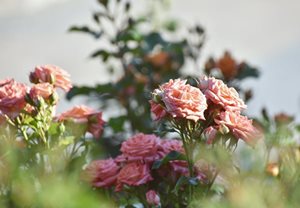It’s that time of the year, not only do the clocks spring forward, but the grass in the garden needs to be cut. So the lawnmower is retrieved from the back of the garage and, once filled with petrol in an act of faith and energetic pulling of the cord, the machine hopefully fires into life. That has been my experience as our lawn has had its first cut.
 Some people are keen gardeners who give lots of time and energy to their gardens - with grass mowed to perfection, green and lush - with no moss - beds filled with a variety of plants exploding with colour. But let me be honest and say this isn’t a description of my garden!
Some people are keen gardeners who give lots of time and energy to their gardens - with grass mowed to perfection, green and lush - with no moss - beds filled with a variety of plants exploding with colour. But let me be honest and say this isn’t a description of my garden!
The first garden
Beside many farmhouses are kitchen gardens, maybe even an orchard, or a plot where vegetables are grown and fruit is picked from the trees and bushes to feed the family. In Genesis, the first book of the Bible, we are introduced to a garden - the Garden of Eden.
Eden must have been a very special place because we read in Genesis 2:8 that God planted it. Eden means ‘pleasure’ and it is here that Adam and Eve were created in God’s image. Gardening for them must have been a joy. However, this place of pleasure was all to change when Adam and Eve decided they knew better than God and disobeyed Him.
You probably know the story. There was only one restriction put on Adam - not to eat of the tree of knowledge of good and evil which grew in the middle of the garden. Adam had the liberty to choose good or evil, obedience or disobedience. When he choose to disobey, things changed for ever. ‘Cursed is the ground because of you…’ (Genesis 3.17) God tells them.
Before the disobedience of Adam, gardening wasn’t a problem. There were no thorns or thistles, no weeds or bugs. So every time you need to pull weeds you can blame Adam!
As a result of their disobedience Adam and Eve were removed from the Garden and were separated from God.
The Bible has a word for this separation, ‘sin’. Sin made a difference not only for Adam and Eve, but for humanity as the Bible simply, but clearly reminds us, ‘…for all have sinned and fall short of the glory of God…’ (Romans 3:23). Further on we read, ‘Therefore, just as sin entered the world through one man, and death through sin, and in this way death came to all people, because all sinned’ (Romans 5:12).
A second garden
The Bible also speaks of another garden where there was separation. In the Garden of Gethsemane Jesus prays, “My Father, if it is possible, may this cup be taken from me. Yet not as I will, but as you will” (Matthew 26:39). The Lord Jesus knew what lay ahead, the pain and the agony of the cross, all to pay the price of our sin, restoring us into a right relationship with God, so that we would be separated no more.
So each of us need to come to the Saviour, to the only one who can restore that personal broken relationship with God and bring us into His family for safekeeping. And when we do the Bible describes those who are believers in Jesus as ‘a well-watered garden’ (Isaiah 58:11)
 Robin Fairbairn is pastor/evangelist with Ballygowan Presbyterian Church in County Down and also works as ministry development officer with The Good Book Company. He lives in the country and has been farming every Saturday for more years than he cares to admit.
Robin Fairbairn is pastor/evangelist with Ballygowan Presbyterian Church in County Down and also works as ministry development officer with The Good Book Company. He lives in the country and has been farming every Saturday for more years than he cares to admit.
His blog appeared in a fortnightly column entitled ‘Good News For the Countryside’, in today’s Farming Life, where people from a farming background, or who have a heart for the countryside, offer a personal reflection on faith and rural life.
You can look at other blogs in this series here.
If you would like to talk to someone about any of the issues raised in this article, please email Rev Kenny Hanna, PCI’s Rural Chaplain at ruralchaplain@presbyterianireland.org or call him on 07938 488 372.